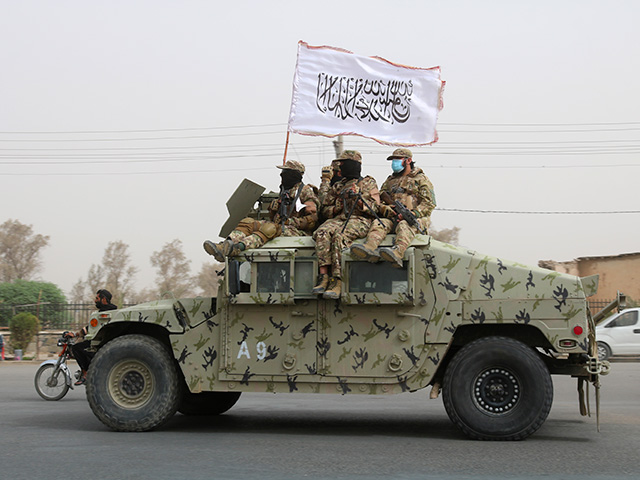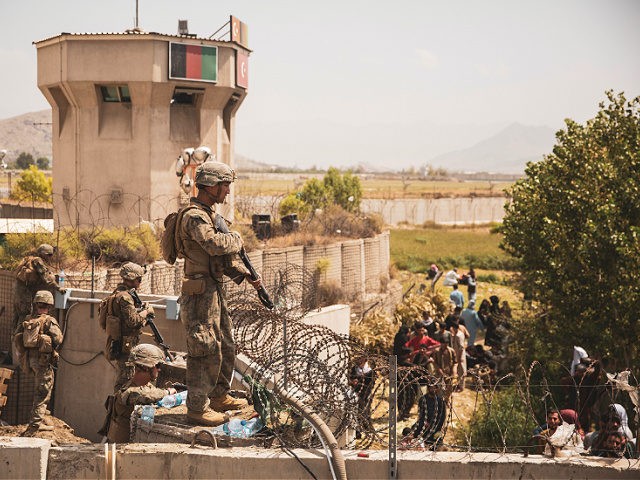John Sopko, the Special Inspector General for Afghanistan Reconstruction (SIGAR), issued his latest report on Monday.
The report revealed the United States and its allies have supported the Afghan economy with “cash shipments” averaging $80 million that “arrive in Kabul every 10-14 days” ever since the Taliban takeover and President Joe Biden’s disastrous withdrawal in 2021. The U.S. has sent over $11 billion in assistance to Afghanistan and Afghan refugees since then.
Sopko quoted U.N. assurances that the money is “placed in designated U.N. accounts in a private bank,” rather than being “deposited in the central bank or provided to the Taliban.”
The U.N. Assistance Mission in Afghanistan (UNAMA) stressed that the cash deliveries are “carefully monitored, audited, inspected, and vetted in accordance with U.N. financial rules and processes.”
SIGAR did not wade into the argument about the fungibility of foreign aid money that has raged ever since the Biden administration paid a $6 billion ransom to Iran for five hostages. If the U.S. and other governments are spending $3 billion to feed, house, and medicate Afghans, it frees up $3 billion for the irresponsible and malevolent Taliban government to spend on its unsavory priorities.
Also, while humanitarian groups correctly point out that economic instability hurts the poorest residents of Afghanistan, the Taliban is poised to reap benefits from the economy that American taxpayers have spent so much money “stabilizing.”
SIGAR did, however, note that the Taliban has a long history of stealing foreign aid, blocking oppressed minority populations from receiving it, and “siphoning cash from U.N. shipments, or collecting royalties, or charging fees on cash shipments.”

Newly recruited personnel joining Taliban security forces demonstrate their skills during their graduation ceremony in Herat on February 9, 2023. (MOHSEN KARIMI/AFP via Getty Images)
“The U.N., NGOs (non-governmental organizations), and other entities involved in aid efforts have paid administrative fees to various Taliban ministries, and these fees were recorded by the Taliban as inland revenue,” the report noted.
“Taliban interference into U.N. and NGO activities has continued to rise throughout 2023, limited beneficiary access to lifesaving assistance,” SIGAR warned, quoting a U.N. official who said, “violence against humanitarian personnel, assets, and facilities had a significant impact on the humanitarian response” in the last quarter.
Humanitarian agencies documented 127 instances of impeded access, including 26 aid workers arrested by the Taliban — a 73-percent increase in detentions over 2022. The Taliban has also demanded “sensitive data” from struggling humanitarian groups, including lists of their staff members and beneficiaries.
“As a result, 49 U.N humanitarian partner programs temporarily suspended operations in August, and 36 remained suspended as of September,” SIGAR noted, singling out “Taliban interference with staff recruitment” as one of the major problems.
The Taliban has interfered with U.S. government aid programs as well, detaining local staffers who tried to “prevent the diversion of aid to non-eligible individuals.”
The Taliban’s discrimination against women who work for aid agencies continued, leaving only about a quarter of humanitarian operations that employ both male and female staffers “fully operational.”
SIGAR said the Taliban has aggressively “shaped governing institutions to serve their aims and cement power,” imposing an “ultra-conservative and radical religious ideology based on its own harsh interpretation of Islam” despite early promises to be more moderate than the previous Taliban regime.

Taliban fighters patrol on the road during a celebration marking the second anniversary of the withdrawal of U.S.-led troops from Afghanistan, in Kandahar, Afghanistan. (AP Photo/Abdul Khaliq, File)
“The de facto authorities have promulgated edicts and other pronouncements which actively discriminate against women and girls and curtail the fundamental freedoms of the population. Human rights violations are prevalent, with a lack of accountability for the perpetrators,” said the U.N. human rights office, as quoted in SIGAR’s report.
The Biden administration’s current approach seems to involve dangling full diplomatic recognition and legitimacy as a carrot for the Taliban to “respect the human rights and fundamental freedoms of all Afghans,” as the State Department put it.
The Taliban has displayed very little interest in nibbling at this carrot, preferring instead to develop economic relations with China, an equally brutal government that cares nothing for Western concepts of human rights.
The Biden administration remains engaged with China on “issues of mutual interest,” and millions of American dollars are still flowing into the Afghan economy, so it is difficult to argue that the Taliban is not in control of that uneasy relationship.

COMMENTS
Please let us know if you're having issues with commenting.